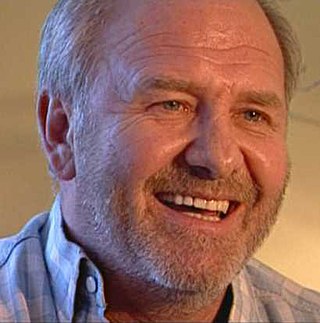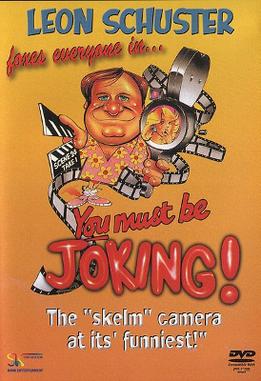Related Research Articles

Leon Ernest "Schucks" Schuster is a South African filmmaker, comedian, actor, prankster and singer.

The cinema of South Africa refers to the films and film industry of South Africa. Films have been made in English and Afrikaans. Many foreign films have been produced about South Africa, including many involving race relations.

Euzhan Palcy is a French film director, screenwriter, and producer. Her films are known to explore themes of race, gender, and politics, with an emphasis on the perpetuated effects of colonialism. Palcy's first feature film Sugar Cane Alley received numerous awards, including the César Award for Best First Feature Film. With A Dry White Season (1989), she became the first black female director to have a film produced by a major Hollywood studio, MGM.

Cinema of Africa covers both the history and present of the making or screening of films on the African continent, and also refers to the persons involved in this form of audiovisual culture. It dates back to the early 20th century, when film reels were the primary cinematic technology in use. As there are more than 50 countries with audiovisual traditions, there is no one single 'African cinema'. Both historically and culturally, there are major regional differences between North African and sub-Saharan cinemas, and between the cinemas of different countries.

You Must Be Joking! is a 1986 South African candid camera comedy film, directed by Elmo De Witt who also produced it with Hermann Visser in collaboration with Johan Scholtz, it stars Leon Schuster in his first feature role, Mike Schutte, Kallie Knoetze, Golda Raff, Martino and Janine Pretorius, It became popular with South African audiences and gave rise to the sequel You Must be Joking! Too.
The Cinema of Niger began in the 1940s with the ethnographical documentary of French director Jean Rouch, before growing to become one of the most active national film cultures in Francophone Africa in the 1960s-70s with the work of filmmakers such as Oumarou Ganda, Moustapha Alassane and Gatta Abdourahamne. The industry has slowed somewhat since the 1980s, though films continue to be made in the country, with notable directors of recent decades including Mahamane Bakabe, Inoussa Ousseini, Mariama Hima, Moustapha Diop and Rahmatou Keïta. Unlike neighbouring Nigeria, with its thriving Hausa and English-language film industries, most Nigerien films are made in French with Francophone countries as their major market, whilst action and light entertainment films from Nigeria or dubbed western films fill most Nigerien theatres.

The Last Lion is a 1972 South African action film directed by Elmo De Witt and starring Jack Hawkins, Karen Spies and Dawid Van Der Walt. The screenplay was written by Wilbur Smith, one of his rare original screenplays. He used a similar story later on in his novel A Time to Die.
Wild Season is a 1967 South African drama film directed by Emil Nofal and starring Gert Van den Bergh, Marie Du Toit and Antony Thomas. A family operating a trawler off the South African coast, suffers numerous personal tragedies.
Die Kandidaat is a 1968 South African drama film directed by Jans Rautenbach and starring Gert Van den Bergh, Marie Du Toit and Regardt van den Bergh. The film was regarded as critical of the apartheid system, and it faced some censorship from the authorities.
Jans Rautenbach was a South African screenwriter, film producer and director. His 1968 film Die Kandidaat proved controversial and received some censorship in South Africa, because of perceived criticism of the apartheid system. His last film, Abraham, was a hit at the South African box office.
Katrina is a 1969 South African drama film directed by Jans Rautenbach and starring Katinka Heyns, Jill Kirkland and Don Leonard. Based on a play called Try for White by D Warner, the film depicts the lives of a family of a Coloured South Africans, who in the apartheid system are considered neither white nor black, in which Katrina, the daughter, attempts to appear white, before her secret is exposed. The screenplay was written by Emil Nofal.
Jannie totsiens is a 1970 South African psychological horror film directed by Jans Rautenbach and starring Cobus Rossouw, Katinka Heyns, Jill Kirkland and Don Leonard. A new arrival to a mental institute is ostracised by the other patients, until they use him as a scapegoat when another patient dies. It has been viewed as representing an allegory of South African society at the time.
The 43rd annual Venice International Film Festival was held on 30 August to 10 September, 1986. It was the last edition directed by Gian Luigi Rondi.
Boetie Gaan Border Toe is a 1984 satire film set during the South African Border War. The film was directed by Regardt van den Bergh, and stars Arnold Vosloo, Frank Dankert and Frank Opperman. Production was assisted by the South African Defence Force (SADF).
You Must Be Joking Too! is a 1987 South African comedy film directed by Leon Schuster and produced by Elmo de Witt. The film's music was composed by Johan van Rensburg.
Katinka Heyns is a South African actress, director and filmmaker in the South African film industry. She is known for including feminist perspectives in her films, as well as for commenting on South African politics and culture. Her work includes the film Paljas which was selected as the South African entry, but eventually not nominated for Best Foreign Language Film at the 70th Academy Awards.

Thelma Gutsche was a South African filmmaker, film historian, writer, and arts patron, referred to as "South Africa's most accomplished early cinema historian" by a later film scholar.
The Cinema of Benin refers to the film industry of the Republic of Benin in West Africa.
Debbie, is a 1965 South African drama film directed by Elmo De Witt and produced by Jamie Uys for Jamie Uys Filmproduksies. The film stars Suzanne van Oudtshoorn in lead role along with Leon le Roux, Gert van den Bergh and Dawid van der Walt in supportive roles.
Satanskoraal is a 1959 South African action film directed by Elmo De Witt and produced by Jamie Uys for Jamie Uys Filmproduksies. It is the first South African movie to be filmed underwater.
References
- ↑ "Elmo de Witt". IMDb .
- 1 2 Armes R. Dictionary of African Filmmakers, pp. 56–57 (Indiana University Press; 2008) ISBN 0253351162
- ↑ Maingard J. South African National Cinema, p. 135 (Routledge; 2013) ISBN 1135123969
- ↑ Tomaselli K. The Cinema of Apartheid: Race and Class in South African Film, p. 112 (Routledge; 2013) ISBN 1317928407